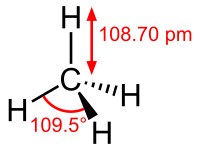
Photo from wikipedia
A 20%Co/0.5%Re/γAl2O3 Fischer–Tropsch catalyst was poisoned by four potassium salts (KNO3, K2SO4, KCl, and K2CO3) using the aerosol deposition technique, depositing up to 3500 ppm K as solid particles. Standard… Click to show full abstract
A 20%Co/0.5%Re/γAl2O3 Fischer–Tropsch catalyst was poisoned by four potassium salts (KNO3, K2SO4, KCl, and K2CO3) using the aerosol deposition technique, depositing up to 3500 ppm K as solid particles. Standard characterization techniques (H2 chemisorption, BET, TPR) showed no difference between treated samples and their unpoisoned counterpart. The Fischer–Tropsch activity was investigated at industrially relevant conditions (210 °C, H2:CO = 2:1, 20 bar). The catalytic activity was significantly reduced for samples exposed to potassium, and the loss of activity was more severe with higher potassium loadings, regardless of the potassium salt used. A possible dual deactivation effect by potassium and the counterion (chloride and sulfate) is observed with the samples poisoned by KCl and K2SO4. The selectivity toward heavier hydrocarbons (C5+) was slightly increased with increasing potassium loading, while the CH4 selectivity was reduced for all the treated samples. The results support the idea that potassium...
Journal Title: Industrial & Engineering Chemistry Research
Year Published: 2018
Link to full text (if available)
Share on Social Media: Sign Up to like & get
recommendations!